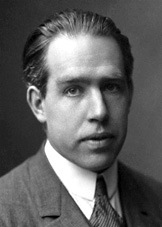What You Believe

“What you believe you are determines your gifts.”
–A Course in Miracles (Book of Spiritual Principles Scribed by Dr. Helen Schucman between 1965 and 1975, and First Published in 1976)
Revising Our Beliefs

“We must continually count on the appearance of new facts, the inclusion of which within the compass of our earlier experience may require a revision of our fundamental concepts.”
–Niels Bohr (Danish Physicist and, in 1922, Winner of the Nobel Prize in Physics, 1885-1962)
Women and the “Over-Attractive” Male
Here’s another one of those pieces of research that leave you thinking, “Didn’t I already know that?”
Researchers at the University of Central Lancashire in England have found that men who are good-looking, single and earn a large income are not as attractive as good-looking men with an average job and income. It may be important that the research was done in England: social status is still far more heavily engrained in society than it is in the United States or Australia.
The research was published in the journal Personality and Individual Differences, and examined how 186 heterosexual female students weighed up the male physical attractiveness and socioeconomic status when considering a long-term relationship. The average age of the test subjects was 23, and they were asked to look at personal ads of a number of men and to rank them in terms of attractiveness as a long-term partner. Each advertisement showed a photograph and provided basic information about the man’s age, occupation and what he was seeking in a partner.
The images of the men had previously been measured on a subjective scale of attractiveness. The men were randomly allocated to eighteen different occupations that varied from an architect and company director to a waiter, postman and gardener.
The researchers found that men who were rated as physically highly attractive but had medium social status, scored better than highly attractive men of high status. The authors speculated that the highly attractive high status men might have been thought to be more likely to be unfaithful in relationships or to be “too good to be true.” I was reminded here of a piece that I wrote in November: many people probably make mistakes in evaluating the potential of relationships simple because they under-estimate themselves.
Not only would it be good to repeat this research outside England, but it would also be a good idea to do similar experiments with women and people with different sexual orientations. There is some research that men at that age tend to make more superficial evaluations about potential partners.
The take home message: don’t try to make yourself look better than you are, it may backfire; don’t under-estimate yourself and look below the surface when making any important decision.
And Fabio, eat your heart out!
“Men in general judge more by the sense of sight than by the sense of touch, because everyone can see, but only a few can test by feeling. Everyone sees what you seem to be, few know what you really are, and those few do not dare take a stand against the general opinion.”
–Niccoló Machiavelli (Italian Writer and Philosopher, 1469-1527)
“Judgment and love are opposites. From one comes all the sorrows of the world. From the other comes the peace of God. Judgment will bind my eyes and make me blind.”
–A Course in Miracles (Book of Spiritual Principles Scribed by Dr. Helen Schucman between 1965 and 1975, and First Published in 1976)
Don’t Underestimate Your Attractiveness!

I wonder how many readers have ever been in a social setting and been a bit depressed by how good-looking everybody else seems to be? I’ve seen quite a number of people who by anyone’s standards were attractive individuals, but who were quite convinced that they were not.
At this point most proponents of pop psychology would jump in and say, “Well he’s got low self-esteem and we need to fix that.” They would probably recommend some exercise involving a mirror and telling him or herself how beautiful, attractive, valuable or special they are.
And they would be dead wrong.
This misperception about the attractiveness of other people is an evolutionary trick that will not be much helped by any number of affirmations.
A very interesting and well-executed study from the University of Texas will be published in next month’s issue of Evolution and Human Behavior. Sarah Hill, a psychologist in David Buss’ evolutionary psychology laboratory. Her research has shown that people of both sexes believe that the sexual competition that they face is stronger than it really is. She beieves that this is useful: it makes people try harder to attract or keep a mate.
What Sarah did was to show heterosexual men and women photographs of people. She asked them to rate both how attractive those of their own sex would be to members of the opposite sex, and also how attractive the members of the opposite sex were. She then compared the scores for the former with the scores for the latter, seen from the other side. Men thought that the men they were shown were more attractive to women than they really were, and women thought the same of the women.
She had predicted the outcome of the study based on a theory developed in the same laboratory by Martie Haselton and David Buss. It is called error-management theory: the idea that when people make errors of judgment hey always tend to make the error that is going to be least costly. Research has shown something to which many women can attest: men often tend to misinterpret innocent friendliness as a sign that women are sexually interested in them. Haselton and Buss reasoned that men who are trying to decide if a woman is interested sexually could err in one of two ways. They can mistakenly believe that she is not interested, in which case they will not bother trying to have sex with her; or they can mistakenly believe she is interested, try, and be rejected. Trying and being rejected comes at relatively little cost. However, form an evolutionary perspective, not trying at all could lead the major cost of not being able to spread their DNA around.
The theory is that there is an opposite bias in women’s errors: They tend to undervalue signs that a man is interested in a committed relationship. The evolutionary argument would be that if she guesses wrongly about a man’s intentions, she might have to raise a child on her own.
However, when it comes to assessing physical attractiveness, man and women make the same errors.
We always need to be a bit wary about pushing the perspectives of evolutionary psychology too far. I think that they are valuable, but that we can get into trouble if we apply their insights too liberally: humans are complex creatures who are continuing to evolve rapidly. We are different in every way from the people of a thousand years ago.
But this is a very useful insight into why some many people feel to see themselves as they are.
The moral of the story: have courage in initiating new relationships, and look at the whole person: physical, psychological, social, subtle and spiritual.
And don’t forget to use your intuition: the surest guarantor of making the right steps in relationships.
“I never saw an ugly thing in my life: for let the form of an object be what it may, light, shade, and perspective will always make it beautiful.”
–John Constable (English Landscape Painter, 1776-1837)
Memes and Magical Thinking
There were so many excellent papers at this year’s British Association Festival of Science, that I still haven’t had been able to comment on all of them, but here’s another one that I found interesting for two reasons.
Bruce Hood, who is Professor of Experimental Psychology at the University of Bristol, presented an interesting paper on the near-Universality of superstitious beliefs and magical thinking. In his view people are naturally biased to accept a role for the irrational, and magical thinking is hard-wired into our brains.
Magical thinking is invaluable to an artist: being able to make new connections is the key to their creations. But it has long been argued that either rejecting or accepting magical thinking may both be potential triggers of psychopathology. I once treated a young Israeli man who, during the first Gulf War, became convinced that Saddam Hussein was personally writing the Israeli man’s name on each Scud missile. He refused to remove his gas mask, and eventually his thinking became delusional.
Bruce’s conclusion is that magical thinking and a belief in the supernatural is an evolutionary adaptation. He goes on to argue that the rabid atheists who blame organized religion for the spread “illogical thinking” and a belief in the supernatural and are just plain wrong. Instead he contends that religion may capitalize on a natural bias to assume the existence of supernatural forces.
In a world in which religious fundamentalism is something of a challenge, he had this to say:
“It is pointless to get people to abandon their belief systems because they operate at such a fundamental level that no amount of rational evidence or counter evidence is going to be taken on board to get people to abandon these ideas.”
Bruce has carried out studies to show how the brains of even young babies organize sensory information. They supply what is missing and use the information to generate theories about the world.
In adulthood, the visual centers of the brain still fill in details that are not there, as shown in common visual illusions such as the blind spot. Several years ago we did some experimental work on facial recognition, and it is remarkable how little information is needed to recognize a face: the brain supplies the missing pieces of the picture. This childhood “intuitive reasoning” persists in to adulthood and may explain many aspects of adult magical beliefs. We are programmed to see coincidences as significant and to attribute minds to inanimate objects.
One form of this is known as pareidolia in which vague and random stimuli are misperceived as recognizable patterns. Examples of this are seeing shapes in clouds or in a fire. With the new information from the European Space Agency, perhaps we could include seeing the Face on Mars.

Professor Hood used an interesting example. He offered members of the audience the chance to wear a sweater, for which he would pay them a sum of money. They were all happy to do so, until they heard that it had supposedly belonged to a mass murderer, when suddenly there were no takers. Many said that they felt that the clothing was contaminated with evil.
But I don’t think that Bruce has taken something else into account. According to the theory of spiral dynamics, we are all mixtures of Memes. We tend to associate magical thinking with the Purple Meme. It would be very valuable to look at a person’s developmental level and to see how much he or she engages in magical thinking. Someone once said to me, “Are you superstitious?” I said, “No, but I do understand that there are many forces at work in the Universe, and we do not yet know all of them.”
Are you a magical thinker, or is it that you are aware of the unseen forces of the Universe?
“The universe is full of magical things, patiently waiting for our wits to grow sharper.” –Eden Philpotts (Indian-born English Novelist, Dramatist and Poet, 1862-1960)
Halloween, Attitudes and Beliefs

Today being Halloween, I was thinking about some of the deep beliefs that some people across the world still hold about this day.
I’ve just come across an extremely interesting report from Baylor University entitled American Piety in the 21st Century.
It is a survey conducted by the Gallup Organization of 1,721 randomly selected individuals, that examined some of their beliefs and attitudes.
I was particularly drawn to it because of the undoubted relationships between health, faith, religion and spirituality.
Here were some of the key findings:
- 8% of men and 18% of women surveyed thought that psychics fortunetellers. Astrologers and palm readers could foretell the future
- 41% believed that ancient civilizations such as Atlantis once existed
- 37% believed that places could be haunted
- 28% thought that it was possible for the mind to directly influence the physical world
- 25% believed that some UFOs are extraterrestrial spaceships
My first reaction to these figures is just how low they are. Certainly lower than many previous studies of this type.
I was also struck that few of the respondents could have been aware of some of the research that seems to indicate the existence of some form of psychokinesis: the ability of the mind to influence objects in the material world.
Of course this work is controversial, but there really is enough data for us to realize that there is a case to be answered.
If you are interested in looking into this in more detail, I recently compiled a short reading list that you can find on the Amazon website.
Miracles and Expectations
“I believe there is no source of deception in the investigation of nature which can compare with a fixed belief that certain kinds of phenomena are impossible.”
–William James (American Psychologist and Philosopher, 1842-1910)
There was a very interesting article published in the British Medical Journal in 1983. My old friend Peter Fenwick wrote a very interesting paper on prayer that cited this story.
Christian missionaries had gone to Ethiopia, but were required to leave by the Government in power at the time. They left behind some Gospels. When they returned some years later, they found not only a flourishing church, but also a community of believers amongst whom miracles like those mentioned in the New Testament happened every day. There had been no missionaries to teach them that such things were not supposed to be taken literally. They created miracles because they had never been told that they could not. There were no scientifically trained missionaries to tell them that miracles only occurred in the first century of the Church’s existence, or in special circumstances if a highly trained priest is present.
This sort of case – and there are many others – gets straight to the heart of the role of belief and expectation in our lives. Is there one fixed external reality, and we are no more than puppets dancing on cosmic strings? I’ve heard many people say that. Just recently the Editor of Psychology Today said that he felt that everything in human behavior could be reduced to genes, learning and reflexes. I must respectfully disagree. Free will is not an illusion, and our hopes and expectations have a massive impact on the structure of our lives and our reactions to the events that will come our way.
How many things are you failing to achieve because of fears or negative expectations?
Some people might describe the Ethiopians as unsophisticated. I would not: these good people can teach us something that many of us have forgotten.
Clean up and focus your expectations, ensure the purity of your intentions and see what happens in your life.
I’ve put just a few quotations below. I selected them for this reason: as you look at them, see how many are directly relevant to your life.
Do any of them give you ideas about managing your own life? If not, you may like to have a look at/listen to Healing, Meaning and Purpose or the articles and podcasts that I shall be posting this month.
“Men are probably nearer the central truth in their superstitions than in their science.”
–Henry David Thoreau (American Essayist and Philosopher, 1817-1862)
“Perhaps the only limits to the human mind are those we believe in.”
–Willis Harman (American Scientist and Late President of the Institute of Noetic Sciences; 1920-1997)
“It is one of the most common of mistakes to consider that the limit of our power of perception is also the limit of all there is to perceive.”
C.W. Leadbeater (English Clergyman and Theosophical Writer, 1854-1934)
“The only way of discovering the limits of the possible is to venture a little way past them into the impossible.”
–Arthur C. Clarke (English-born Writer, 1917-)
“Only if you reach the boundary will the boundary recede before you. And if you don’t, if you confine your efforts, the boundary will shrink to accommodate itself to your efforts. And you can only expand your capacities by working to the very limit.”
–Hugh Nibley (American Scholar in the Church of Jesus Christ of Latter-day Saints, 1910-2005)
“Know from whence you came. If you know whence you
came, there are absolutely no limitations to where you can go.”
–James Baldwin (African-American Writer, 1924-1987)
“Give yourself the freedom to explore the possibility of life without limits. Goals are dreams with deadlines, a means to an end but not the ultimate purpose of life.”
–Glynis Nunn (Australian Heptathlete, 1960-)
“Imposing limitations on yourself is cowardly because it protects you from having to try, and perhaps failing.”
–Vladimir Zworykin (Russian-born American Physicist and, in 1923, the inventor of the “Iconoscope:” the first television camera, 1889-1982)
“Divine wisdom is inexhaustible; the limitation is only in the receptive faculty of the form.”
–Henricus Madathanus (German Philosopher, Alchemist and Co-Founder of the Fraternity Rosae Crucis, 1575-1639)
Infomania
Here’s a study that came I under the radar, but is an important contribution to our on-going discussions about the perils of multi-tasking.
Glenn Wilson, a psychologist at my alma mater in London did a most interesting study funded by, of all people, Hewlett Packard.
It was a postal study carried out at the Institute of Psychiatry in London, and the main finding was that excessive use of technology reduced workers’ intelligence.
Those distracted by incoming email and phone calls were fond to have a 10-point fall in their IQ. That would be more than twice that found in studies of the impact of smoking marijuana. People who are constantly breaking away from tasks to react to email or text messages suffer similar effects on the mind and the brain as losing a night’s sleep
More than half of the 1,100 respondents said they always responded to an email "immediately" or as soon as possible, with 21% admitting they would interrupt a meeting to do so.
Do we really need any more evidence to confirm the dangers of multitasking and constant partial attention?
I don’t think so.
Therefore I’m going to continue to publish tips and techniques for dealing with the barrage of information that threatens to drown us.
Even before the oceans begin to rise….
Manifesting and Prayer
“All will happen as you want it, provided you really want it.”
–Sri Nisargadatta Maharaj (Indian Spiritual Teacher and Exponent of Jnana Yoga and Advaita Doctrine, 1897-1981)
“The spirit is life. The mind is the builder. The physical realm is the result.”
–Edgar Cayce (American Healer, Mystic and Psychic, 1877-1945)
In Healing, Meaning and Purpose, we discuss manifesting: the art of flowing with the Universe to achieve your perfect outcomes. We talked about the limiting beliefs that can prevent us from fulfilling our potential. Do not try and put limits on the help that may come to you. Too often people tell me that they are not seeing any meaningful coincidences or that their prayers are not being answered. The problem is usually that they have decided on the form in which the sign will appear, or of the way in which help will arrive, instead of having an open mind, and remembering that “God works in mysterious ways.”
I have the privilege of delivering hundred of speeches, lectures and workshops each year, but earlier today I was in the unusual position of being in the audience for a really great speech. I was reminded of an old story that appears in Chapter 11 of my forthcoming book Sacred Cycles:
A priest is stranded in his house as the waters of a nearby river are rising rapidly. He can still see out of his first floor window when a rescue boat rows up to his house.
“Get in says the rescuer.”
“No” says the priest, “I’m praying and waiting for God to save me.”
As the floodwaters rise, he moves to the second floor, when he hears the sound of a motorboat containing two rescuers.
“Get in, they say, it is getting worse.”
“No” says the priest, “I’m praying and waiting for God to save me.”
Finally the waters have driven him onto the roof of his house when he sees a helicopter hovering above him.
“Let us winch you to safety,” says the winch man.
“No” says the priest, “I’m praying and waiting for God to save me.”
Finally the helicopter is forced to leave and sadly the priest perishes.
When he arrives in the next world he is angry with God, and says,
“Why didn’t you save me? I prayed with all my might!”
To which he hears this response: “Three times I tried to save you: I sent a rowboat, a motorboat and a helicopter, and you rejected all the help that I sent to you.”
Please do not ever make that mistake. I have had more than one person feel guilty about seeing a physician and taking medications, feeling that they should have been healed by faith alone. Then they have realized that their prayers may indeed have been answered by the provision of medications and a person with the skills to use them.
Before asking for Divine assistance, ask yourself what you can do to help yourself and others: rather than trying to command God and the Universe to do your bidding, try reporting for duty!
“God manifests himself in what is hidden.”
–Thomas Merton (French-born American Trappist Monk and Writer, 1915-1968)
Technorati tags: Manifesting Prayer Synchronicity Sri Nisargadatta Maharaj Edgar Cayce Expectation Belief Thomas Merton
Using your Core Values for Rapid Stress Management
“The cyclone derives its powers from a calm center. So does a person.” — Norman Vincent Peale (American Cleric, Writer and Self-Help Expert, 1898-1993)
As a professional speaker, I often forget that glossophobia – fear of public speaking – is the most common phobia in America today. I have a whole toolkit of techniques that I use for helping people with this problem, but I am always interested in new methods that can work quickly.
A study of 80 UCLA undergraduates published in the journal Psychological Science suggests that taking a few minutes to contemplate your personal values (Click here to take an online assessment of your personal values) in the moments before a tense situation, like making a speech, an examination or a visit to the dentist, can keep stress levels low.
People in the study who affirmed their values before delivering a speech had significantly lower levels of one of the stress hormones – cortisol – than did the control group, and psychological measures also indicated that they were less stressed.
“People can’t live with change if there’s not a changeless core inside them. The key to the ability to change is a changeless sense of who you are, what you are about and what you value.” –Steven R. Covey (American Author and Businessman, 1932-)
Reaffirming your core values is one of the keys to the development of resilience, and that is what was happening in this study. For anyone who is interested in dealing with fear of public speaking or in developing personal resilience, we shall be putting new articles on my website in the next few days.
“Remain calm, serene, always in command of yourself. You will then find out how easy it is to get along.” –Paramahansa Yogananda (Indian Spiritual Teacher and, in 1920, Founder of the Self-Realization Fellowship, 1893-1952)
Technorati tags: stress, stress management, core values






